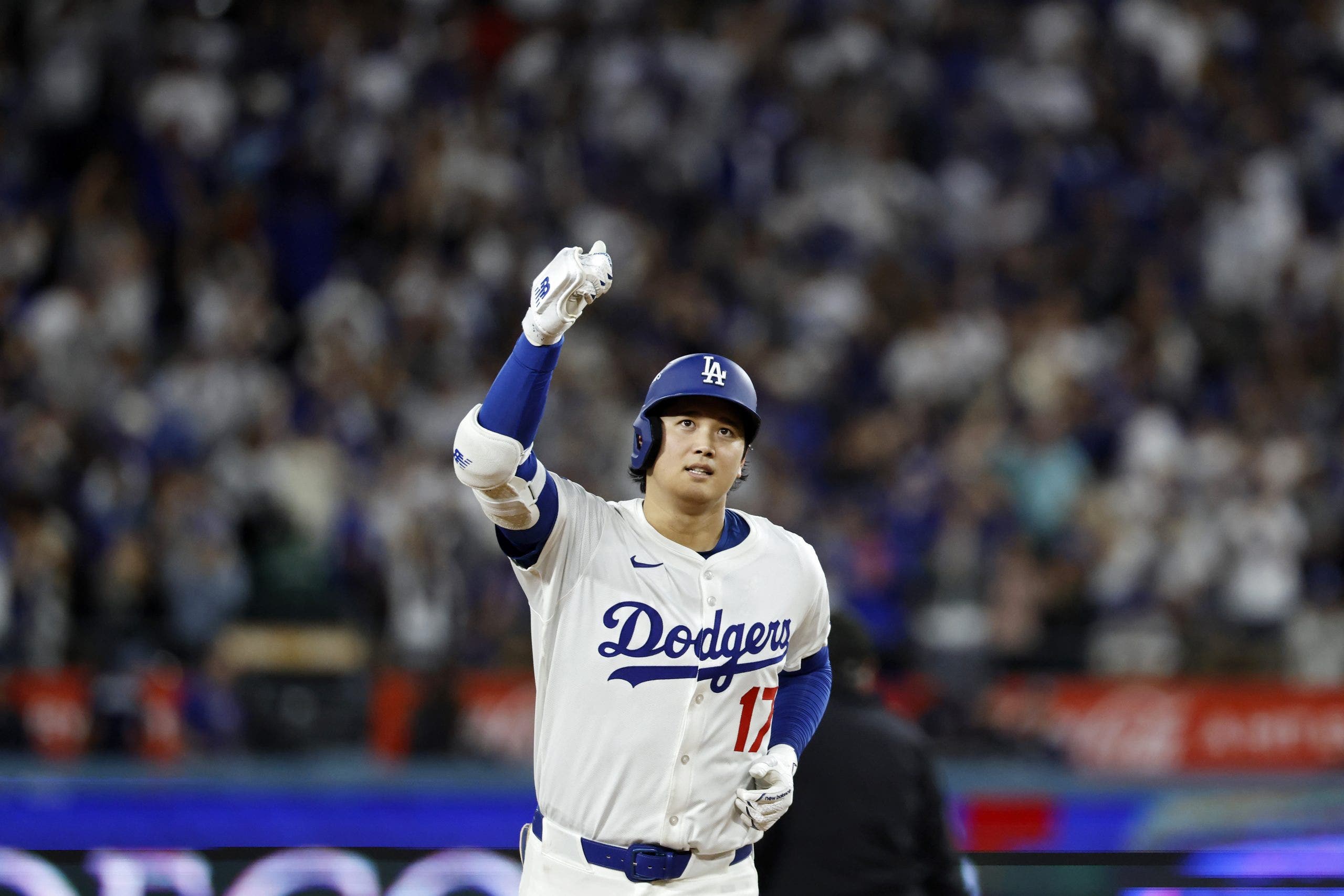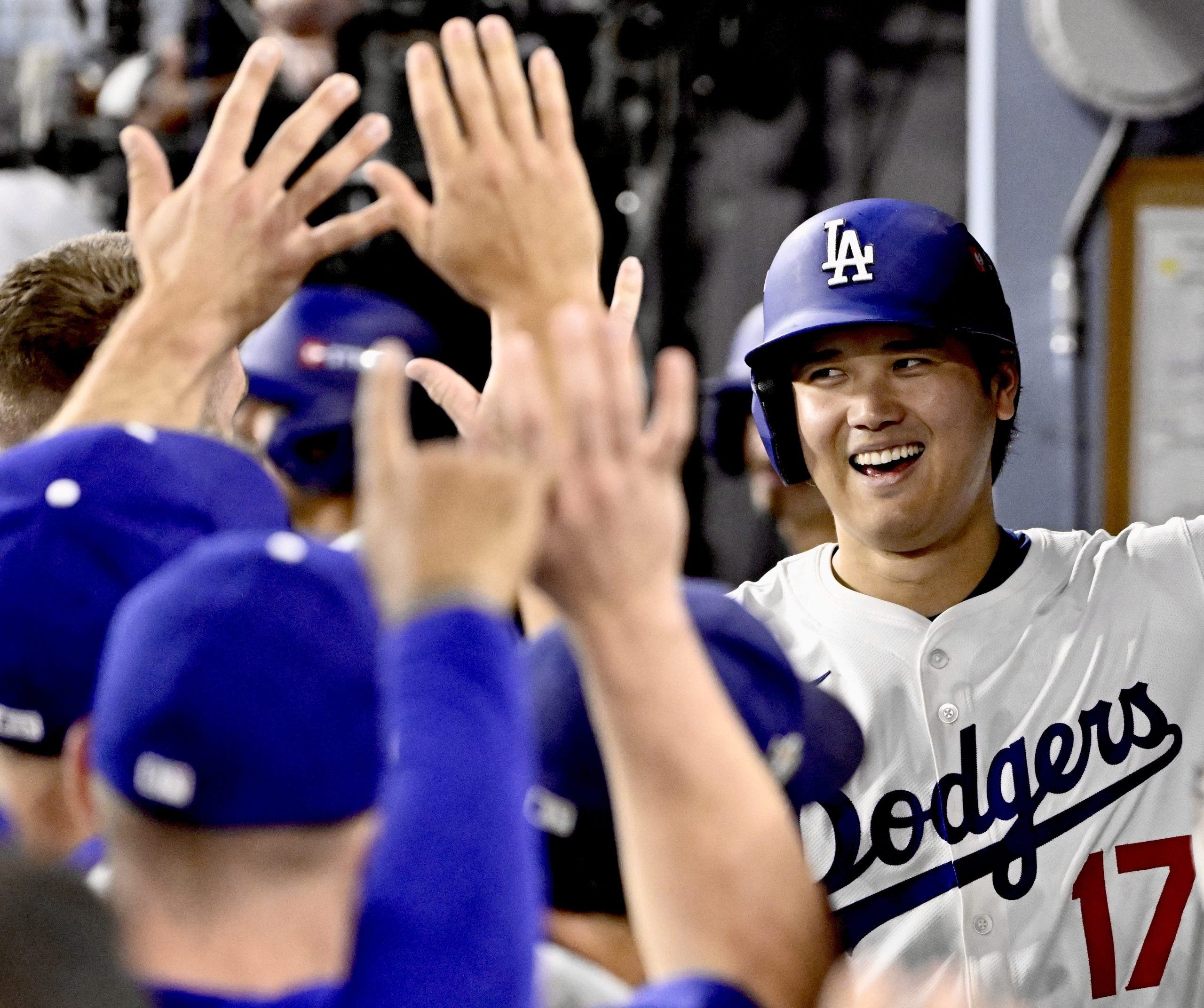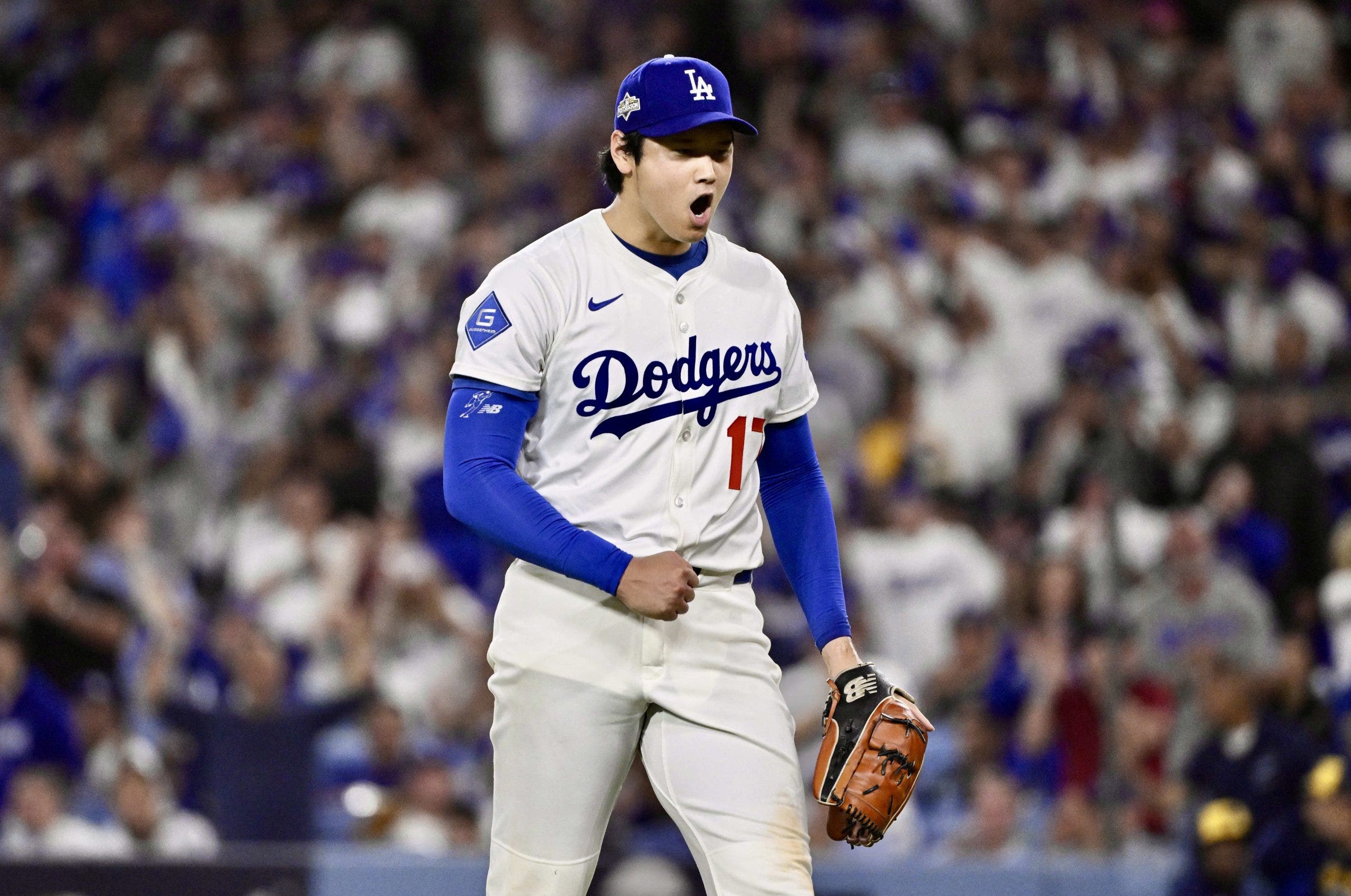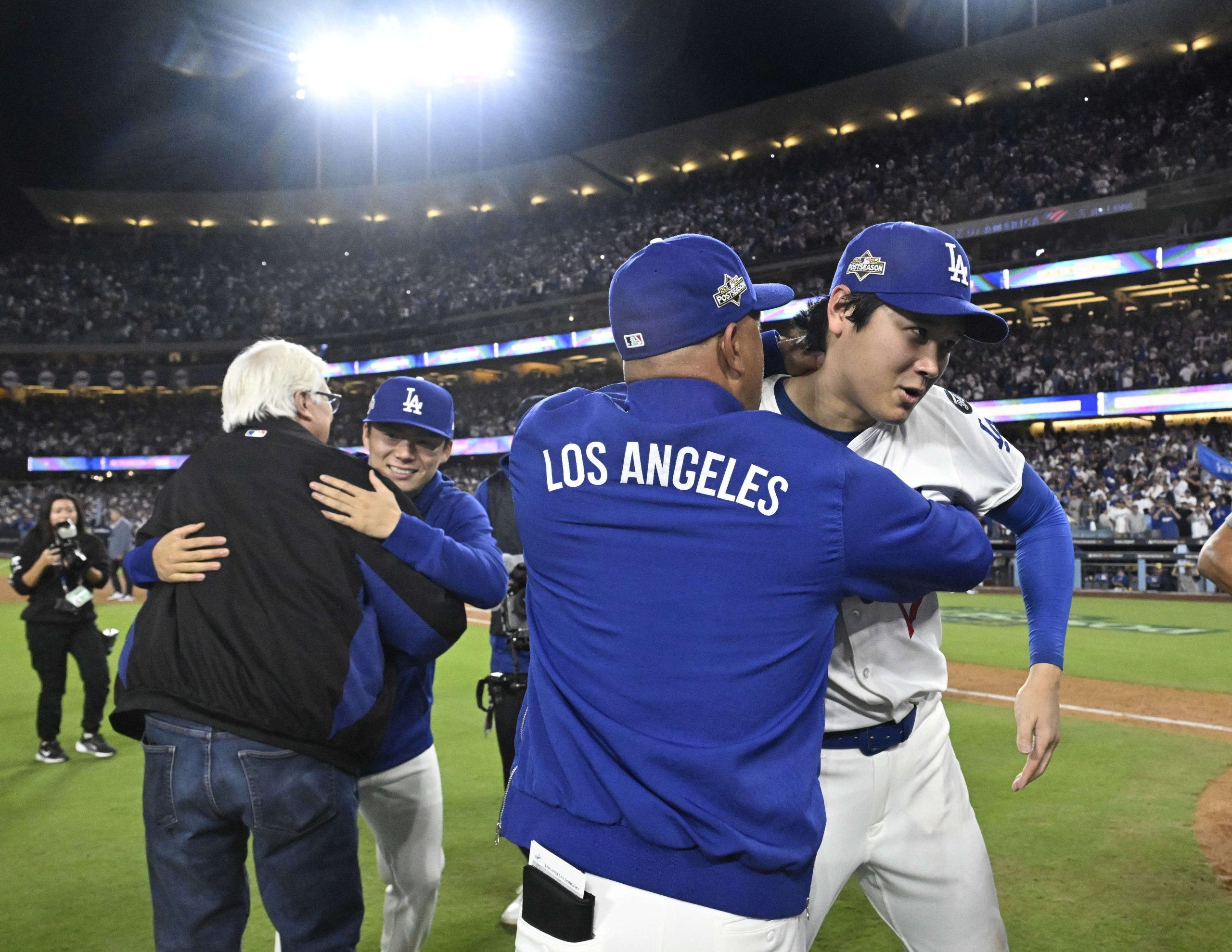LOS ANGELES — Freddie Freeman put his hands on top of his head. Max Muncy slapped the dugout railing with a hearty laugh. Tommy Edman shook his head in disbelief.
As 52,883 fans roared and pandemonium surrounded Shohei Ohtani after his second of three home runs, on a night in which he also fired six scoreless innings as a pitcher to send the Dodgers back to the World Series with a performance for the ages, the game’s most distinctive talent glided around the bases in the fourth inning without so much as cracking a smile.

(Photo by Ronald Martinez/Getty Images)
In recent days, some of those around Ohtani noticed more of an edge. He entered Friday night in a rut, going 3-for-29 with no home runs since the start of the Division Series. Two days prior, he took batting practice on the field at Dodger Stadium for the first time this year, a telling sign of the urgency he felt to start performing to his capabilities. He seemed frustrated as he fielded repeated questions about the toll of being a two-way player and his struggles as a hitter on his start days.
“All those things,” Dodgers manager Dave Roberts said, “I think were fuel to his fire.”
Ohtani responded tersely with his words, insisting that one did not affect the other.
And then he responded emphatically with his play in Game 4 of the National League Championship Series, delivering the most extraordinary postseason display in baseball history.
“He woke up this morning to people calling him out for how poorly he had played in the CS,” Dodgers president of baseball operations Andrew Friedman told me, “and 12 hours later he’s standing on the podium as the MVP. That says everything we need to know about him.”
Ohtani, the baseball unicorn who last year created baseball’s first ever 50/50 club in a performance in which he went 6-for-6 with three home runs, two doubles, two steals and 10 RBIs, again accomplished something never before seen in any game in regular season or postseason history.
As a hitter, he went 3-for-3 with three home runs and a walk. As a pitcher, he fired six scoreless innings with 10 strikeouts. The final score read 5-1 in favor of the Dodgers; what everyone in attendance at Dodger Stadium will remember was 3-0, Ohtani over Brewers.
“I can’t wait for when I’m a little older and my kids are asking about, ‘What’s the greatest thing you’ve ever seen in baseball?” Muncy said. “I can’t wait to pull up this game today. That’s the single best performance in the history of baseball. I don’t care what anyone says.”
It was also everything the Dodgers could have possibly imagined when they committed $700 million for an all-around talent the likes of which the game had never witnessed. They watched him make history with his bat and his legs as a DH only in 2024. They’ve now helped him return to the two-way form that made him the most unprecedented force in the sport’s history.
Friday night, though, stands out as a singular spectacle, both for Ohtani and the game’s annals.
In a performance that inspired awe in the teammates who felt lucky enough to witness it, Ohtani continued to stretch the imagination and redefine the limits of what was once considered possible.
“I feel truly blessed to be able to be on the field for that performance tonight,” Muncy said.
“I know he’s the best player in the game, and he’s going to go down as the best player ever to play this game,” said Miguel Rojas. “But today was just the best performance ever.”
“It must be fun to be him, huh?” said Kiké Hernández.

(Photo by Keith Birmingham/MediaNews Group/Pasadena Star-News via Getty Images)
Hernández, unlike most, at least understands what it’s like to produce a three-homer game to send his team to the World Series. The Dodgers’ superutility player did just that in Game 5 of the 2017 NLCS at Wrigley Field.
Only, as Hernández was quick to point out, he didn’t do it while striking out 10 batters as a pitcher. And he didn’t do it while hitting 1,342 majestic feet worth of homers.
“There’s only one person who can do that in the world, and in the history of this game,” Hernández continued, “and it’s him.”
‘We can’t comprehend just how special this is’
On Wednesday afternoon, during the Dodgers’ workout day, the sounds of Michael Bublé reverberated peculiarly throughout Dodger Stadium. It was Ohtani’s walk-up song. Usually, the slugger’s work takes place in the cages below the stadium. But as he attempted to work his way out of an October slump, he decided to try something new.
“He just wanted to change the backdrop,” said Dodgers hitting coach Aaron Bates, who insisted that most of Ohtani’s troubles during a 1-for-18 NLDS were more the result of the Phillies’ pristine pitching than it was the struggling hitter.
A horde of Dodgers players stuck around to watch, many of them playfully ribbing Ohtani as he put on his own personal home run derby. One of the baseballs clanked off the roof at the top of the right-field pavilion.
Two days later, he sent a baseball even farther.
“I think it’s the limitations of the human brain,” Friedman said. “We can’t comprehend just how special this is.”

(Photo by Keith Birmingham/MediaNews Group/Pasadena Star-News via Getty Images)
On Friday night, Ohtani took the mound to the song “Do or Die” from 30 Seconds to Mars. Then he spent the next nine innings doing a little bit of everything to deliver the Brewers their fatal blow.
In the first inning, he struck out Jackson Chourio on a 100.3 mph fastball, Christian Yelich on a 100.2 mph heater and William Contreras on an 87.6 mph sweeper. He had spent most of the postseason watching his teammates pick him up
On this night, he didn’t need to wait for them. He walked off the mound, grabbed his bat, stepped to the plate to begin the bottom of the frame, and sent the sixth pitch from Jose Quintana 446 feet into the right-field pavilion to give himself a 1-0 lead.
“This time around,” Ohtani said through an interpreter, “it was my turn to be able to perform.”
Ohtani is again the MVP frontrunner after leading the National League in slugging (.622) and OPS (1.014) for the second straight season. But in games that he pitched during the regular season, his slugging percentage dipped 66 points and his OPS dropped 135 points.
Friday represented the first time he (or any player) had ever hit a leadoff home run in a game in which he pitched. It was also the first home run by a Dodgers pitcher in postseason franchise history.
The night would get progressively more historic as Ohtani continued to mow down the opposition and deliver souvenirs.
“There’s a reason why he’s the greatest player on the planet,” Roberts said. “He created a lot of memories for a lot of people.”

(Photo by Keith Birmingham/MediaNews Group/Pasadena Star-News via Getty Images)
In the fourth inning, Ohtani lifted the home run that sent his teammates into hysterics. The 469-foot blast cleared the roof that he had rattled days prior. It was the farthest homer anyone had hit at Dodger Stadium this year.
“Kind of took everybody’s breath away,” said Mookie Betts.
“I’ve played a lot of games here, I’ve never seen a ball go that far,” Muncy said. “I know Statcast said like 460, but Statcast is wrong. That ball is at least 500 feet.”
The drive left Friedman’s mouth agape. He was trying to track it, and he didn’t see it come down.
Ohtani was just getting started. To that point, he had struck out five Brewers batters and allowed three baserunners. He struck out two more in the fifth and another two in the sixth as he got his splitter working, a pitch that elicited seven called strikes and four swings and misses and finished off the last five of his 10 strikeouts.
“He was able to do whatever he wanted once he got that going,” said Dodgers pitching coach Mark Prior.
Ohtani walked off the mound to “M-V-P” chants after the sixth. He was still cruising when Roberts sent him back out for the seventh, at which point the Brewers finally mounted a response with a walk and a single to start the frame. Ohtani departed at 100 pitches to a rousing ovation. Reliever Alex Vesia entered and made sure to preserve baseball history, keeping Ohtani’s night scoreless in the books as he got a popout and a double play to extinguish the threat.
Vesia, who understands the physical exertion it takes just to get through one or two innings, was left dumbfounded by Ohtani’s work.
“It’s nothing that I’ve ever seen,” Vesia told me. “I think it’s going to be talked about for years to come. It’s incredible. What he does from a pitching standpoint and in the batter’s box, I don’t think anybody else is going to do it. I really don’t.”
Ohtani’s night on the mound had concluded.
His offensive showcase was still ongoing.
After his second home run, there were already murmurs in the Dodgers dugout about whether it was the single greatest game anyone had ever played.
“Everyone at the same time just said, ‘You know he’s going to hit another one,’” Muncy recalled.
In his third and final at-bat, by then out of the game as a pitcher, Ohtani received a 99 mph fastball from Trevor Megill in the seventh and sent it out 113.6 mph off the bat to left-center.
It was the encore of his set, the last stroke of his masterpiece, the silencer of his critics and the dagger to the Brewers.
“No one can put more pressure on himself than he does,” Friedman said. “You can only keep Shohei down for so long.”
Rowan Kavner is an MLB writer for FOX Sports. He previously covered the L.A. Dodgers, LA Clippers and Dallas Cowboys. An LSU grad, Rowan was born in California, grew up in Texas, then moved back to the West Coast in 2014. Follow him on X at @RowanKavner.








